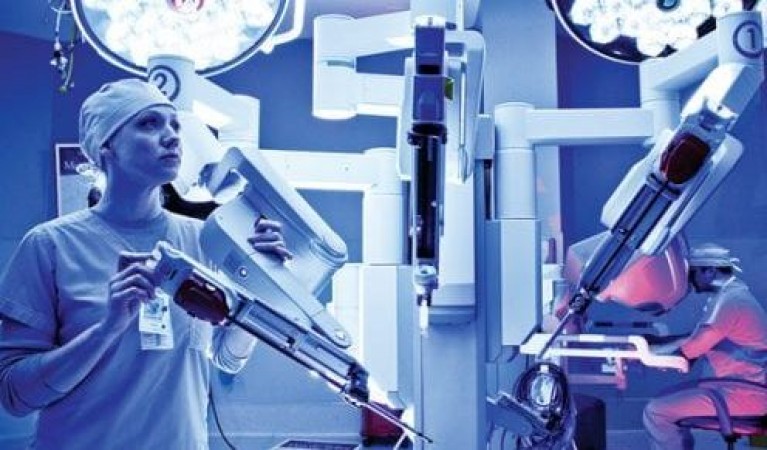
In recent years, technology has played a pivotal role in transforming various industries, and healthcare is no exception. The integration of technology into healthcare delivery has revolutionized the way medical services are provided, making them more efficient, accessible, and personalized. From electronic health records to telemedicine and artificial intelligence, technology has the potential to improve patient outcomes, streamline processes, and enhance the overall quality of healthcare. This article explores the significant impact of technology in transforming healthcare delivery and the benefits it brings to patients and healthcare providers.
1. Introduction
Technology has become an integral part of our daily lives, transforming the way we communicate, work, and access information. In healthcare, technology has emerged as a game-changer, empowering both patients and healthcare professionals with innovative tools and solutions. The integration of technology in healthcare delivery has the potential to improve patient care, enhance efficiency, and reduce costs.
2. Electronic Health Records (EHR)
Electronic Health Records (EHR) have replaced traditional paper-based medical records, enabling healthcare providers to store, manage, and exchange patient information electronically. EHR systems offer numerous advantages, such as easy access to patient data, streamlined workflows, and improved coordination among healthcare providers. With EHRs, healthcare professionals can quickly retrieve medical history, track diagnoses, and ensure seamless communication between different departments.
3. Telemedicine and Remote Patient Monitoring
Telemedicine has revolutionized the delivery of healthcare services, particularly in remote areas or situations where physical access to healthcare facilities is limited. It allows patients to consult with healthcare professionals remotely through video conferencing, telephone, or mobile applications. Additionally, remote patient monitoring enables continuous tracking of vital signs and health parameters, providing timely interventions and reducing the need for hospital visits.
4. Artificial Intelligence (AI) in Healthcare
Artificial Intelligence (AI) is transforming healthcare by enabling machines to simulate human intelligence and perform complex tasks. AI applications in healthcare include medical imaging analysis, personalized treatment plans, predictive analytics, and robotic-assisted surgeries. By leveraging AI, healthcare providers can enhance diagnostic accuracy, optimize treatment protocols, and improve patient outcomes.
5. Internet of Things (IoT) and Wearable Devices
The Internet of Things (IoT) has enabled the connection of various devices and systems in healthcare, creating a network of interconnected devices. Wearable devices, such as smartwatches and fitness trackers, equipped with sensors and data collection capabilities, empower individuals to monitor their health status continuously. These devices can track vital signs, physical activity, sleep patterns, and even detect early warning signs of potential health issues.
6. Robotics and Automation in Healthcare
Robotic technologies and automation have found their place in healthcare, revolutionizing surgical procedures, rehabilitation processes, and patient care. Robots can assist surgeons during complex surgeries, perform repetitive tasks with precision, and provide support in physical therapy. Automation streamlines administrative tasks, such as appointment scheduling and billing, freeing up healthcare professionals to focus more on direct patient care.
7. Big Data Analytics and Predictive Modeling
The abundance of health-related data, coupled with advancements in big data analytics, has opened up new possibilities for understanding patterns, predicting outcomes, and improving decision-making in healthcare. Analyzing large datasets can uncover valuable insights, such as disease trends, treatment efficacy, and population health patterns. Predictive modeling helps identify individuals at high risk, enabling preventive interventions and personalized care.
8. Virtual Reality (VR) and Augmented Reality (AR) in Healthcare
Virtual Reality (VR) and Augmented Reality (AR) technologies have made their way into healthcare, offering immersive experiences and innovative training opportunities for healthcare professionals. VR can be used for pain management, mental health therapies, and surgical simulations. AR overlays digital information onto the real world, enhancing surgical visualization, medical education, and remote collaborations among healthcare teams.
9. Blockchain Technology in Healthcare
Blockchain technology, known for its decentralized and secure nature, holds immense potential in healthcare. It can improve data security, interoperability, and patient privacy by enabling secure and tamper-proof sharing of medical records. Blockchain can also facilitate streamlined medical research, consent management, and efficient supply chain management in the pharmaceutical industry.
10. Cybersecurity in Healthcare
As healthcare becomes increasingly digitized, the importance of cybersecurity cannot be overstated. With sensitive patient data being stored and transmitted electronically, healthcare organizations must implement robust cybersecurity measures to protect against data breaches and unauthorized access. Robust encryption, secure networks, and regular vulnerability assessments are vital to safeguard patient information and maintain trust.
11. Ethical Considerations and Challenges
The integration of technology in healthcare delivery raises ethical considerations and challenges that need careful attention. Issues such as data privacy, consent management, algorithm bias, and the digital divide must be addressed to ensure equitable and responsible use of technology in healthcare. Additionally, ethical frameworks and regulatory guidelines need to be developed to govern the use of emerging technologies.
12. Future Trends and Possibilities
The future of healthcare technology is full of possibilities. Emerging technologies such as nanomedicine, 3D printing, genomics, and precision medicine hold the promise of further transforming healthcare delivery. These advancements may lead to personalized therapies, faster diagnostics, and more efficient disease management, ultimately improving patient outcomes and population health.
13. Conclusion
Technology has become a catalyst for transformation in healthcare delivery, offering innovative solutions that enhance patient care, improve efficiency, and revolutionize the way healthcare is delivered. From electronic health records and telemedicine to artificial intelligence and robotics, technology has reshaped the healthcare landscape. Embracing these advancements, while addressing ethical considerations and challenges, will pave the way for a future where technology empowers healthcare professionals and provides patients with better access, quality, and outcomes.
The Impact of Social Media on Political Activism and Social Movements
Apple Unveils Official Store on WeChat, Revolutionizing China's Mobile Commerce